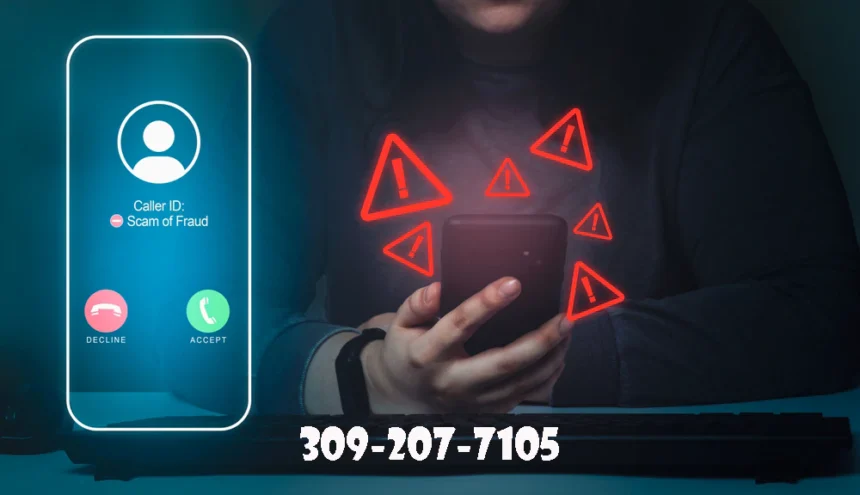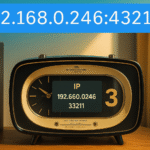The phone number 309-207-7105 has become the center of attention among users who have received strange, unsolicited, or even threatening calls. It belongs to the 309 area code, which is registered in Illinois, United States. Normally, receiving a local call shouldn’t raise concerns, but the way this number has been used has made many people suspicious.
Calls from this number are often reported as robocalls or scam attempts. These reports include impersonations of authorities, fake threats about unpaid taxes or bank issues, and demands for urgent payments.
In most cases, people who answer are either scared or confused because the caller speaks with confidence, often pretending to be from a trusted organization.
This article will help you understand how these scams work, why 309-207-7105 is considered unsafe, and how you can protect yourself and your family.
Nature of Reports About 309-207-7105
Online platforms like WhoCallsMe, 800Notes, Truecaller, and Reddit have recorded several user experiences about this number. Many say that the number either leaves voicemails about legal action or calls at random hours. The most common reports include:
- Receiving silent or hang-up calls multiple times a day.
- Getting voicemails stating you have a pending arrest warrant or tax issue.
- Robotic voices claiming to be from the IRS or government department.
- Aggressive language, telling victims to call back immediately.
Some users say they felt anxious or scared after receiving such messages. That’s the scammer’s goal—to make you react quickly. Once the scammer feels they have your attention, they try to convince you to send money or personal data.
Even though 309 is a valid area code, scammers can spoof numbers to make them look local. This increases the chances of people answering.
Common Scam Techniques Used
Scammers are getting smarter. They use psychology and modern technology to trap people into falling for their lies. With 309-207-7105, users report some of the most widely used scam techniques:
- Government Impersonation: The caller claims they are from the IRS, FBI, or local police. They accuse you of not paying taxes or being involved in a crime.
- Bank or Account Fraud: The scammer says they’ve detected suspicious activity in your bank account or PayPal account and need you to confirm some “details.”
- Legal Threats: They may claim you’ve missed jury duty or have an unpaid traffic ticket, and you’ll be arrested if you don’t pay a fine immediately.
- Prize Scams: Some calls say you’ve won a lottery or a prize, but you must pay a small “processing fee” first—this is always fake.
- Tech Support Scams: They claim there’s a virus on your computer or smartphone and offer to fix it—after you let them access your device.
These scams often target elderly people, students, and busy professionals who don’t have time to verify the information. The key tactic is urgency—they want you to act now and think later.
How to Recognize a Scam Call
Scam calls might sound convincing, but there are always warning signs if you pay close attention. If you receive a call from 309-207-7105 or a similar number, ask yourself:
- Is the caller being aggressive or threatening? Real authorities don’t yell at you or scare you.
- Are they asking for gift cards, wire transfers, or crypto? No real business or government office will request payment like that.
- Do they refuse to give their name or contact details? Scammers avoid leaving a trail.
- Are they refusing to send you anything in writing? That’s another red flag.
- Is the call robotic or auto-recorded? Scams often use bots to save time and reach more people.
If even one of these signs is present, it’s safest to hang up.
What to Do If You Receive a Call
If you’ve answered a call from 309-207-7105, don’t panic. Take the following steps to stay protected:
- Hang up immediately if anything seems strange or threatening. Don’t wait for the full message.
- Don’t give out any information—not your name, address, or banking details.
- Block the number on your smartphone to prevent future calls.
- Report the number to authorities. In the U.S., the FTC has a complaint portal at ReportFraud.ftc.gov.
- Warn others—family, friends, or coworkers—so they don’t become the next victim.
If you accidentally gave out information or sent money, contact your bank immediately and consider placing a fraud alert on your accounts.
Reporting and Lookup Resources
You don’t need to deal with scam calls alone. There are excellent tools and websites to help:
- Truecaller: A smartphone app that shows who’s calling and flags scam numbers.
- NumLookup: Allows you to check unknown numbers online for free.
- Hiya: Another app that detects and blocks scam or robocalls.
- FTC Complaint Assistant: U.S. residents can report scams here easily.
- Your telecom provider: Major carriers like T-Mobile, AT&T, and Verizon have their own spam protection features.
These services work best when many users report numbers. Every time you report, you help build a safer digital space.
Staying Safe from Phone Scams
Scams will continue to evolve, but so can our defenses. To stay protected:
- Be skeptical: If it sounds too serious or too good to be true, it probably is.
- Use call screening apps to filter robocalls and scam attempts.
- Keep your personal info private, even if the caller sounds professional.
- Educate your loved ones, especially elders or teens who may not recognize phone scams.
- Don’t trust caller ID—scammers can fake it.
- Set up voicemail: Let unknown calls go to voicemail. A real caller will leave a message.
Preventing phone scams is about being alert, not afraid.
Conclusion
The phone number 309-207-7105 has become a known source of unwanted and potentially harmful scam calls. Many users have shared experiences involving threats, fake government impersonation, and demands for urgent payment—clear signs of fraud.
It’s important to remember that legitimate organizations never pressure you to act immediately, especially not over the phone. If you receive a call from this number, don’t panic—just hang up and avoid engaging.
Blocking the number and reporting it to platforms like the FTC or your local telecom authority can help prevent others from falling victim. Tools like Truecaller and NumLookup also make it easy to identify suspicious calls.
By staying alert and sharing information with friends and family, you help build a safer digital environment for everyone. Stay informed, stay cautious, and trust your instincts when dealing with unknown callers.
Also Read:
Ximena Brittan Gunusen: Why Personalized Learning Matters More Than Ever
Burda at Ivy Tech Valparaiso: Real People Shaping the Future of Community Education
Use 1.5f8-p1uzt for Next-Gen Texture Compression: Save Space Without Losing Detail
Donkshakers Breakdown: What Makes a Donk Ride Truly Unique?
janell kochevar with element 3: Where Marketing Meets Mission-Driven Communication









